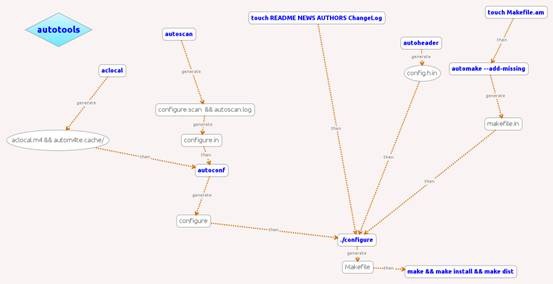fedora automatic compile autotools usage
fedora自动化编译autotools的使用
具体操作步骤
l 准备好源码文件helloworld.c 及 Makefile.am文件。
l 执行autoscan生成configure.scan,将configure.scan改为configure.in并修改configure.in
l 然后执行:
n aclocal;
n autoheader;
n touch README NEWS AUTHORS ChangeLog
n autoconf;
n automake --add-missing;
n ./configure;
n make;
n ./helloworld ; ---运行程序
n make dist ---制作发布的包
n make dist ---制作发布的包并对其进行测试检查
n make clean --清除make命令产生的目标文件及可执行文件
automake autoconf 自动化编译说明
利用autotools自动生成makefile文件,自动化编译自己的工程,autotools工具只需要用户输入简单的目标文件、依赖文件、文件目录就可以轻松地生成Makefile了。
首先安装autotools系列工具,包括aclocal、autoscan、automake、autoheader、autoconf等。
可以通过rpm –qa | grep auto来查看各个应用程序,如果没有
yum install automake即可安装。
详细步骤:
1.建立自己的工程,编写源文件并创建Makefile.am
1)最顶层目录名为模块名 helloworld
源文件放在模块下面的src子目录,例如helloworld/src
2) 在src 下面,创建源文件main.c
3) 在helloworld目录下面创建Makefile.am文件--(为Makefile.in的模板文件,.am扩展名是automake的缩写),内容如下:
SUBDIRS=src
4) 在helloworld/src 目录下创建Makefile.am文件 内容如下:
bin_PROGRAMS=helloworld
helloworld_SOURCES=main.c
其中,PROGRAMS表示要产生的是可执行文件,有多个可执行文件文件时,可用空格分开,而bin表示可执行文件的安装目录SOURCES表示生成可执行文件需要的源文件,有多个源文件时,也用空格分开。比如想生成两个可执行程序helloworld1和helloworld2,那么就需要写成:
bin_PROGRAMS=helloworld1 helloworld2
helloworld1_SOURCES=main1.c
helloworld2_SOURCES=main2.c
2.运行 autoscan --创建autoconf的模板
autoscan --将生成configure.scan和autoscan.log文件,它会在给定目录及其子目录树中检查源文件,若没有给定目录,就在当前目录及其子目录树中进行检查。它会搜索源文件以寻找一般的移植性问题并且创建一个文件configure.scan,通过这个文件我们可以创建autoconf需要的模版文件。
1).目录下面生成了configure.scan 文件,利用命令
mv configure.scan configure.in --将生成的configure.scan更改为autoconf需要的文件模版configure.in
configure.in 文件为autoconf 的模板文件,内容如下所示,其中#行为注释行:
# -*- Autoconf -*-
# Process this file with autoconf to produce a configure script.
AC_PREREQ([2.68])
AC_INIT([FULL-PACKAGE-NAME], [VERSION], [BUG-REPORT-ADDRESS])
AC_CONFIG_SRCDIR([src/main.c])
AC_CONFIG_HEADERS([config.h])
# Checks for programs.
AC_PROG_CC
# Checks for libraries.
# Checks for header files.
# Checks for typedefs, structures, and compiler characteristics.
# Checks for library functions.
AC_CONFIG_FILES([Makefile
src/Makefile])
AC_OUTPUT
2). 修改configure.in文件
将
AC_INIT([FULL-PACKAGE-NAME], [VERSION], [BUG-REPORT-ADDRESS])
修改为:
AC_INIT(helloworld, 0.1, shaoguangleo@gmail.com) =--初始化autoconf
并添加
AM_INIT_AUTOMAKE(helloworld, 0.1) =--初始化automake 必须的宏,这个如果不添加就会导致在autoconf时出错,信息大概为configure.in:no proper invocation of AM_INIT_AUTOMAKE was found
3.运行 aclocal -- 复制所有的宏命令
aclocal
备注:configure.in 里面包含了一系列的宏命令,运行aclocal的目的是把工程需要的宏命令展开。(aclocal.m4 就是configure.in中用到的宏定义)会生成autom4te.cache文件夹和aclocal.m4文件。
4.运行autoheader --生成配置头文件的模板config.h.in并创建4个必要的文件
autoheader
备注:此时再创建4个必要的文件
touch README NEWS AUTHORS ChangeLog
README :描述模块的功能,用法和注意事项
NEWS : 描述模块最新的动态
AUTHORS : 模块的作者及联系方式
ChangeLog : 记录模块的修改历史
上述几个文件可以暂时为空。
5. automake --add-missing -- 生成Makefiel.in和所需要的脚本
automake --add-missing --其中add-missing选项会让automake自动添加一些必须的脚本文件。
6. autoconf -- 生成configure脚本
autoconf
--生成configure脚本
7. ./configure -- 生成最终的Makefile文件
./configure
configure 通常有两个参数
1) --prefix 用来制定安装目录 linux默认/usr/local
2) --host 用于交叉编译
8 make =-- 编译
make
9.make install 安装
make install
10.make dist或者make distcheck =--发布软件包
make dist或者make distcheck
生成helloworld-0.1.tar.gz




 浙公网安备 33010602011771号
浙公网安备 33010602011771号